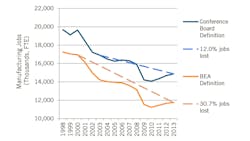How Companies, Government Can Bolster Manufacturing as Growth Slows
Credited with helping jump-start the United States’ post-recession economy, the domestic manufacturing “renaissance” has created jobs and supported countless industries across the country. However, recent analyses from the Information Technology and Innovation Foundation (ITIF) and the Reshoring Initiative demonstrates that manufacturing is still on shaky ground, with better corporate decision-making and the support of our lawmakers essential to sustain continued growth.
The ITIF report notes a nearly 31% decline in U.S. manufacturing employment between 2000 and 2013, as well as flat or declining U.S. output in comparison to other countries.
This reduction in the rate of reshoring and FDI follows five years of consistent growth from 2010 to 2014. The Reshoring Initiative calculates that the flow of manufacturing jobs changed from a loss of about 140,000 per year in 2003 to a gain of about 10,000 in 2014; with about 60 percent of those jobs coming from China, most going to the Southeast and Texas, with strongest growth in transportation equipment and primarily driven by a need for shorter lead times.
How Business and Public Policy Leaders Can Strengthen US Manufacturing
Manufacturing companies can help bring work back to the U.S. by shifting their sourcing decision metric from purchase price variance to total cost of ownership. All of the non-price costs, risks and strategic impacts of offshoring typically amount to 15 to 25 percent of total cost, which is enough to more than outweigh the currency and other headwinds.
Government can lend a hand here by providing a level playing field. In addition to lowering the U.S. dollar — especially against the countries that have manipulated their currencies so successfully — strengthening our skilled workforce by shifting focus from “college for all” to “post-secondary training or education for all” and lowering corporate income taxes, Congress should reduce the regulatory burdens that hamper America’s manufacturers.
One immediate step Washington can take to support American manufacturers is to reform the permitting process for U.S. minerals and metals mines.
One immediate step Washington can take to support American manufacturers is to reform the permitting process for U.S. minerals and metals mines. As the literal building blocks of manufacturing, and with demand for minerals expected to rise in the coming years, it’s no small wonder that 91 percent of manufacturing executives are concerned about the availability of minerals and metals and supply disruptions outside of their control.
The current U.S. mine permitting process — which can take the better part of a decade to complete — prevents these manufacturers from reaping the benefits of an estimated $6.2 trillion worth of domestic minerals and metals. Despite the U.S. being one of the largest mineral repositories in the world, manufacturers are more than 50 percent dependent on imports for 43 key minerals.
Last week, the House approved a bill introduced by Rep. Mark Amodei, R-Nev., that would address mine permitting delays and offer regulatory certainty to project developers. With similar legislation from Sen. Lisa Murkowski, R-Alaska, also under consideration in the Senate’s broader package of energy reforms, this is an important step forward in reducing an inefficient process harmful to so many industries.
Manufacturing trends have made a good start in the last five years. I hope that the Senate will move swiftly to follow the House’s lead and help support and restore the industry that makes up the backbone of the U.S. economy.
Harry Moser is the Founder of the Reshoring Initiative. The National Mining Association is a sponsor of the Reshoring Initiative.
About the Author

Harry Moser
Founder
Harry Moser, founder of the Reshoring Initiative, grew up experiencing the glory of U.S. manufacturing. With more than 45 years of manufacturing experience (most recently 25 years as president, chairman and then chairman emeritus of GF AgieCharmilles), Moser is a leading industry spokesman for reshoring and for developing the skilled manufacturing workforce required by reshoring.
The not-for-profit Reshoring Initiative ‘s Mission is to bring back U.S., and more generally North American, manufacturing jobs by helping companies see that, increasingly, they will be more profitable if they produce and source in or near their market.

